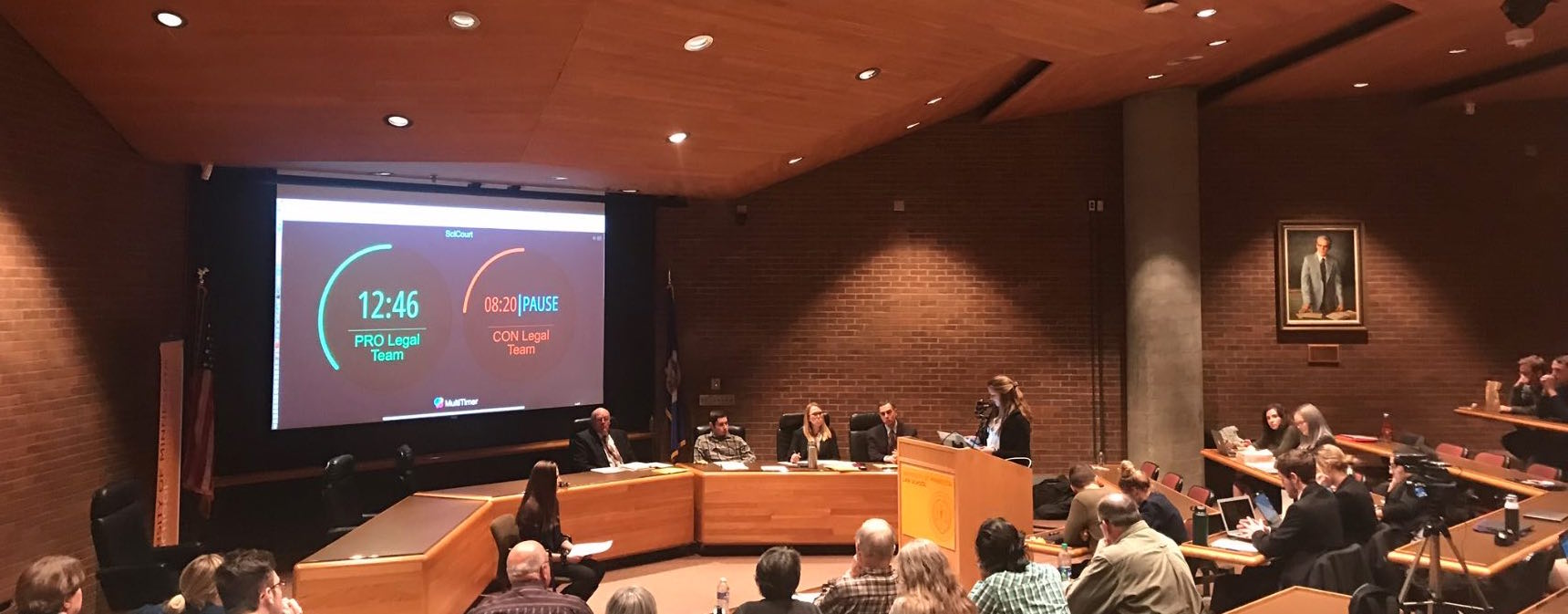
Welcome to Science Court!
Science Court is a project designed to combat polarization in American society and strengthen democracy. It is run as an interdisciplinary course in the University of Minnesota Honors Program involving students from across the university. The students select a controversial issue and spend an entire semester studying it in depth to determine the facts (based on sound scientific research) and then argue it in a mock trial in front of a jury of citizens with a mix of views and backgrounds. The public is engaged through compelling audio, video and online content generated by the students about the preparations, trial and verdict. The trial is free and open to the public.



The 2022 Science Court case is
Grading practices at the University of Minnesota can lead to bias, stress, and disincentivize learning, new innovative student assessment methods should be adopted
This year's Science Court is in partnership with the University of Minnesota (UMN) Student Senate. This topic is inspired by a Student Senate resolution, approved on December 3, 2020, requesting an extension of the UMN policy allowing students to opt for S/N grading (Satisfactory/Not satisfactory) in any course due to the COVID-19 pandemic. The Science Court case generalizes this to a full reevaluation of how students are assessed at UMN. This is timely considering increasing concerns regarding student mental health, the increased emphasis on student diversity and equity, changes in how students learn due to the technological environment, the increase in scholastic dishonesty facilitated by the internet and social media, and the rise of remote learning.
Science Court will consider student assessment holistically exploring what is known from scientific research in domains of knowledge informing this topic and propose two main strategies, Refine versus Reform, for the Student Senate to consider.
- The "Reform" (pro) approach proposes to replace the current UMN system with alternative methods for grading and student assessment proposed in the literature and tested at other institutions.
- The “Refine” (con) approach will argue to largely retain the current UMN grading system with modifications aimed at addressing its limitations based on research findings.
Stay tuned or follow us on twitter or join the Science Court mailing list to be kept informed.
LATEST BLOG POSTS
SciCourt Finalizes Trial Plans

Photo by Felipe Furtado on Unsplash
In the remaining days before Saturday’s trial, Science Court science team members presented on their domains and legal team members practiced their opening and closing statements. During the trial, jurors will have the chance to ask questions to members of the science and legal teams in a process overseen by Science Court legal advisor and judge Bill McGinnis.
SciCourt Begins Final Trial Preparations and Mock Trial

Photo by Glen Carstens-Peters on Unsplash.
As the trial quickly approaches, Science Court spent the week listening to practice testimonies from the science team, who have become Science Court's experts on their respective domains after weeks of research. The legal team was also able to practice asking questions of the science team to get a feel for the trial format.
The trial will feature opening statements by the legal pro and con teams, followed by presentations from each science team member on their areas of research. After each presentation, each legal team will be able to ask questions of the science team as well as deliver a short statement relevant to that subject of research.
SciCourt designs trial session plans for jury deliberation

With just three weeks until trial, Science Court students are preparing their final plans before trial on April 24th. Science team members completed research summaries while the legal team continued to develop arguments for trial.
Madeleine Stankiewicz, a member of the legal con team, said she sees the voluntary service plan as a flexible option for participants. With the mandatory service plan being more restrictive on age, the voluntary plan provides more flexibility when it comes to age requirements to serve. As both legal teams continue to develop their plan, members need to construct arguments to persuade the jury for which option, a mandatory or volunteer service program, is a better solution to combat polarization.